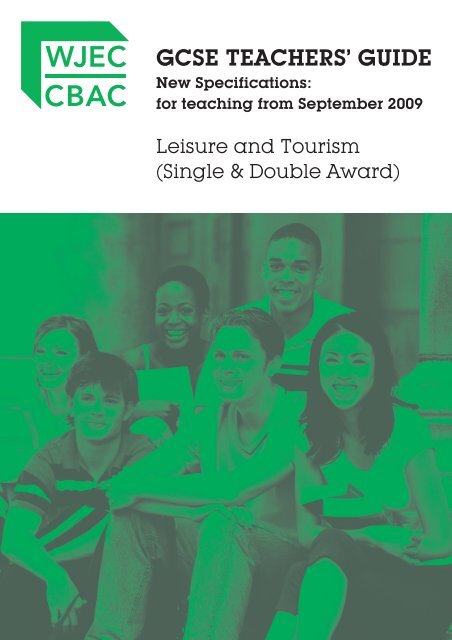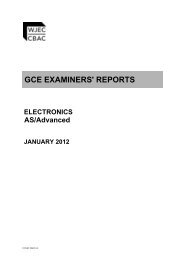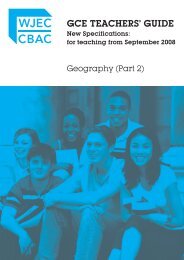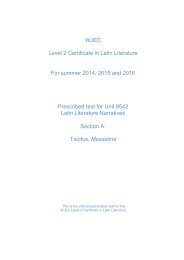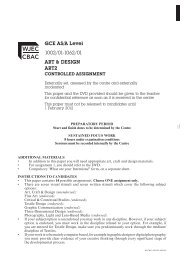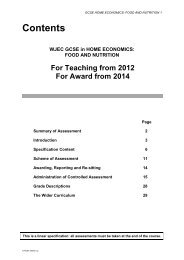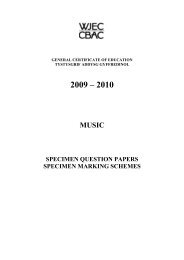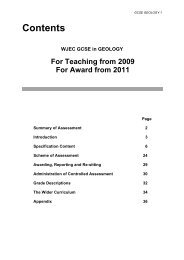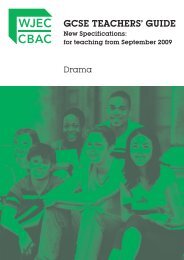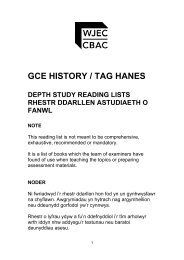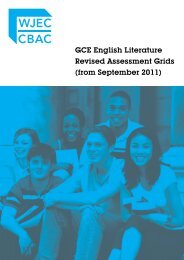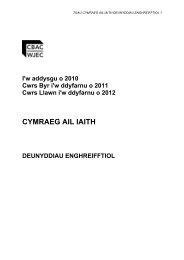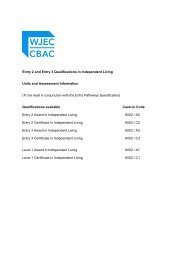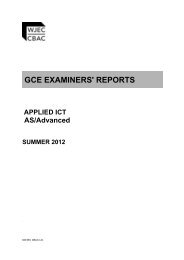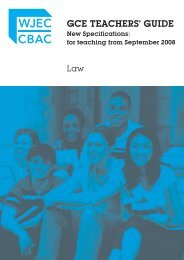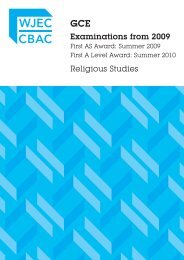Leisure & Tourism Teachers Guide - WJEC
Leisure & Tourism Teachers Guide - WJEC
Leisure & Tourism Teachers Guide - WJEC
You also want an ePaper? Increase the reach of your titles
YUMPU automatically turns print PDFs into web optimized ePapers that Google loves.
GCSE TEACHERS’ GUIDE<br />
New Specifications:<br />
for teaching from September 2009<br />
<strong>Leisure</strong> and <strong>Tourism</strong><br />
(Single & Double Award)
GCSE <strong>Leisure</strong> and <strong>Tourism</strong> <strong>Teachers</strong>' <strong>Guide</strong> 1<br />
Contents<br />
GCSE <strong>Leisure</strong> and <strong>Tourism</strong><br />
<strong>Teachers</strong>’ <strong>Guide</strong><br />
Page<br />
1. Introduction 2<br />
1.1 - Rationale 2<br />
1.2 - Overview of the Specification 3<br />
1.3 - Similarities and Changes 4<br />
2. Support for <strong>Teachers</strong> 5<br />
2.1 - Generic Resources 6<br />
2.2 - NGfL Cymru 6<br />
2.3 - General Websites 7<br />
3. Unit <strong>Guide</strong>s 9<br />
3.1 - Unit 1 9<br />
3.2 - Unit 2 16<br />
3.3 - Unit 3<br />
3.4 - Unit 4<br />
4. Assessment Guidance 24<br />
5. Contribution to <strong>Teachers</strong>' <strong>Guide</strong> 25
GCSE <strong>Leisure</strong> and <strong>Tourism</strong> <strong>Teachers</strong>' <strong>Guide</strong> 2<br />
1. INTRODUCTION<br />
The <strong>WJEC</strong> GCSE <strong>Leisure</strong> and <strong>Tourism</strong> specification will be available from September 2009.<br />
This is a new specification which follows the new GCSE criteria and formats, with two units<br />
comprising a Single Award qualification and four units required for a Double Award.<br />
For both the Single Award and Double Award there will be a combination of assessment by<br />
external examination (40%) and controlled assessment (60%) which is internally assessed<br />
and externally moderated.<br />
For the first availability of units, see page 2 of the specification. The specification is available<br />
to centres throughout the UK.<br />
This guide is one of a number of ways in which <strong>WJEC</strong> provides assistance to teachers<br />
delivering the new specification. Also available are the specimen assessment materials<br />
(question papers and marking schemes) and professional development (INSET)<br />
conferences.<br />
Contact points for GCSE <strong>Leisure</strong> and tourism are as follows:<br />
michael.neale@wjec.co.uk<br />
(Subject Officer)<br />
clare.williams@wjec.co.uk<br />
(Administrative Support Officer)<br />
Subject page<br />
INSET Section<br />
www.wjec.co.uk<br />
inset@wjec.co.uk<br />
www.wjec.co.uk/professionaldevelopment<br />
1.1 Rationale<br />
<strong>Leisure</strong> and tourism activities are firmly based within the locality, region and country.<br />
This will encourage a student-centred approach to learning together with the<br />
opportunity to apply knowledge of leisure and tourism industries in a vocationally<br />
relevant way. The approach to learning followed in this programme will allow the<br />
candidate to contextualise the learning process in a meaningful way. This approach<br />
will provide centres with opportunities to forge links with leisure and tourism<br />
businesses, especially in the local area and region. As a result, centres will be able<br />
to develop cross-sector themes and approaches so that candidates can gain an<br />
insight into related sectors, such as business, marketing, customer service, retail<br />
and hospitality and catering.<br />
The specification encourages an appreciation of how the knowledge, understanding<br />
and skills developed in one unit impact upon and are used in another, and<br />
awareness that these inter-relationships are what happens in the 'real' world.<br />
The end result will be that students will develop their opportunities for progression<br />
into employment in the leisure and tourism industries or higher level qualifications in<br />
these or related sectors.
GCSE <strong>Leisure</strong> and <strong>Tourism</strong> <strong>Teachers</strong>' <strong>Guide</strong> 3<br />
1.2 Overview of the Specification<br />
The content of the specification is divided into four units and two awards are<br />
available:<br />
• Single Award. This award consists of two units - Units 1 and 2.<br />
• Double Award. This award consists of all four units.<br />
SUMMARY OF ASSESSMENT<br />
CONTENT<br />
ASSESSMENT INSTRUMENT<br />
Weighting<br />
S Award<br />
Weighting<br />
D Award<br />
UNIT 1<br />
<strong>Leisure</strong> and <strong>Tourism</strong><br />
Provision in a chosen<br />
area<br />
Controlled Assessment<br />
Consisting of a choice of board prescribed<br />
tasks which should be completed in 6-8<br />
supervised hours.<br />
Internally assessed and externally<br />
moderated<br />
60% 30%<br />
UNIT 2<br />
<strong>Leisure</strong> and <strong>Tourism</strong><br />
Destinations<br />
Written Paper (1 hour 30 minutes)<br />
Section A, consisting of a series of<br />
compulsory short answer questions.<br />
.<br />
Section B, consisting of a series of<br />
compulsory short answer and extended<br />
writing questions based on case studies.<br />
40% 20%<br />
UNIT 3<br />
<strong>Leisure</strong> and <strong>Tourism</strong><br />
Organisations<br />
Controlled Assessment<br />
Consisting of a choice of board prescribed<br />
tasks which should be completed in 6-8<br />
supervised hours.<br />
Internally assessed and externally<br />
moderated<br />
60% 30%<br />
UNIT 4<br />
Choice and Change<br />
in <strong>Leisure</strong> and<br />
<strong>Tourism</strong><br />
Written Paper (1 hour 30 minutes)<br />
Section A, consisting of a series of<br />
compulsory short answer questions.<br />
Section B, consisting of a series of short<br />
answer and extended writing questions<br />
based on case studies<br />
40% 20%
GCSE <strong>Leisure</strong> and <strong>Tourism</strong> <strong>Teachers</strong>' <strong>Guide</strong> 4<br />
1.3 Similarities and Changes to Previous Specification<br />
Similarities<br />
• Controlled assessment (previously portfolio coursework) remains 60%<br />
• Theory remains 40%<br />
• Many theoretical concepts are unchanged<br />
Changes<br />
• Controlled assessment replaces portfolio coursework<br />
• Supervised completion of controlled assessment<br />
• Opportunity for Single or Double Award
GCSE <strong>Leisure</strong> and <strong>Tourism</strong> <strong>Teachers</strong>' <strong>Guide</strong> 5<br />
2.<br />
SUPPORT FOR TEACHERS<br />
<strong>WJEC</strong> provides the following as part of its support for all specifications:<br />
• Examiners’ reports on each examinations series<br />
• Free access to past question papers via the <strong>WJEC</strong> secure website<br />
• Easy access to specification and other key documents on main website<br />
• Itemised feedback on outcomes for candidates at question level<br />
• Regular INSET delivered by Chief Examiners<br />
• Easy access to both the Subject Officer and to administrative sections<br />
<strong>WJEC</strong> contact details, including those of the Subject Officer, are given on page<br />
2 of this guide.<br />
There are a number of recently produced generic textbooks that are more than<br />
adequate for complete delivery of the specification. Realistically, therefore, the<br />
specification can be delivered via current commercial materials targeted at the GCSE<br />
market.<br />
Please Note: For teachers who wish to enhance their own subject knowledge, we<br />
have provided detailed lists of current reading. There is no obligation on either<br />
teachers or students to work their way through this material. Whilst some of the texts<br />
suggested might not be suitable for candidate use, they would be appropriate for<br />
teachers who are interested in refreshing or extending their knowledge.<br />
The websites, by their nature, are generally appropriate for candidate use and<br />
guidance. However, whilst most of the sites are well established and have detailed<br />
topic guidance or invaluable links, they are dynamic and we cannot guarantee their<br />
content or their life span.<br />
As more resources and materials suitable for teachers become available, this support<br />
booklet will be updated to take account of new ideas. <strong>Teachers</strong> may wish to bring<br />
their ideas and suggestions to Inset sessions so that they can be more widely<br />
disseminated to support colleagues.<br />
We would be pleased to receive further suggestions and ideas in order to improve<br />
future editions of this guidance material.<br />
Materials in both Welsh and English will be placed on the NGfL Cymru website. For<br />
detailed teacher guidance, support, schemes of work and many other resources,<br />
please see<br />
www.ngfl-cymru.org.uk<br />
For other enquiries or information, visit the <strong>Leisure</strong> and <strong>Tourism</strong> pages of<br />
www.wjec.co.uk
GCSE <strong>Leisure</strong> and <strong>Tourism</strong> <strong>Teachers</strong>' <strong>Guide</strong> 6<br />
2.1 Resources<br />
With direct links from the <strong>Teachers</strong> <strong>Guide</strong>, an E Book has been produced that<br />
closely follows the specification. This innovative resource has been developed by<br />
senior examiners and is freely available. The E Book further develops the content as<br />
well as containing interactive tasks designed to enhance candidates' understanding.<br />
This invaluable resource is suitable for use on interactive whiteboards as a teaching<br />
aid and as a student resource.<br />
In addition UK publishers produce textbooks for <strong>Leisure</strong> and <strong>Tourism</strong>, including:<br />
..<br />
• Butterworth-Heinemann<br />
• Hodder and Stoughton<br />
• Macmillan<br />
• Pearson Education<br />
• Routledge<br />
• The Haworth Hospitality Press<br />
• Thomson Publishing<br />
• The World <strong>Tourism</strong> Organisation<br />
• Longman<br />
• Collins<br />
Textbooks that might be of use to centres and which cover many aspects of the<br />
specification include:<br />
Cooper et al, <strong>Tourism</strong>: Principles and Practice, Longman (2005)<br />
Holloway, The Business of <strong>Tourism</strong>, Longman (2002)<br />
Lickorish and Jenkins, An introduction to <strong>Tourism</strong>, Butterwoth-Heinemann (1997)<br />
Medlik, Understanding <strong>Tourism</strong>, Butterworth-Heinemann (1999)<br />
Hayward and Fletcher, GCSE <strong>Leisure</strong> and <strong>Tourism</strong>, Heinemann (2004)<br />
Taylor, <strong>Leisure</strong> and <strong>Tourism</strong> for GCSE, Collins (2002)<br />
This list is by no means intended to be definitive but might act as a useful starting<br />
point for candidates.<br />
2.2 National Grid for Learning - Cymru<br />
A particular source of resources and support for teachers of <strong>WJEC</strong> <strong>Leisure</strong> and<br />
<strong>Tourism</strong> has been created on the National Grid for Learning Cymru.<br />
http://www.ngfl-cymru.org.uk<br />
<strong>Teachers</strong> will find a wide range of supporting materials.<br />
Much of this material is intended to be downloaded so that it can be edited by<br />
teachers to suit the needs of their own candidates and centres.<br />
Please keep returning to this site to view new materials as may become available. It<br />
is hoped that teachers will be willing to contribute their own work and ideas to this<br />
site for the benefit of colleagues in other centres.
GCSE <strong>Leisure</strong> and <strong>Tourism</strong> <strong>Teachers</strong>' <strong>Guide</strong> 7<br />
2.3 General Websites<br />
The <strong>WJEC</strong> website www.wjec.co.uk offers information on courses and INSETS as<br />
well as support for teachers, including access to past papers, mark schemes and<br />
examiners' reports.<br />
In addition, the following websites may be of use to teachers involved in the delivery<br />
of GCSE <strong>Leisure</strong> and <strong>Tourism</strong>.<br />
The list represents only a fraction of the range of websites which could be accessed<br />
to support teaching and learning related to the specification.<br />
Organisation<br />
Association of British Travel Agents<br />
Association of Leading Visitor Attractions<br />
Blue Badge <strong>Guide</strong>s<br />
Brecon Beacon National Park<br />
British Airways<br />
British Airports Authority<br />
British Resorts Association<br />
Butlins<br />
Cardiff<br />
Cardiff Airport<br />
CADW<br />
Council for National Parks<br />
Department for Media, Culture and sport<br />
easyJet<br />
Foreign and Commonwealth Office<br />
National Museums of Wales<br />
Natural England<br />
National Statistics Online<br />
Institute of Travel and <strong>Tourism</strong><br />
Pembrokeshire Coast National Park<br />
Website<br />
www.abatnet.com<br />
www.alva.org.uk<br />
www.blue-badge.org.uk<br />
www.breconbeacons.org<br />
www.ba.com<br />
www.baa.com<br />
www.britishresorts.co.uk<br />
www.butlins.com<br />
www.visitcardiff.com<br />
www.cwlfly.com<br />
www.cadw.wales.gov.uk<br />
www.cnp.org.uk<br />
www.culture.gov.uk<br />
www.easyjet.com<br />
www.fco.gov.uk/travel<br />
www.museumwales.ac.uk<br />
www.naturalengland.org.uk<br />
www.statistics.gov.uk<br />
www.itt.co.uk<br />
www.pcnpa.org.uk
GCSE <strong>Leisure</strong> and <strong>Tourism</strong> <strong>Teachers</strong>' <strong>Guide</strong> 8<br />
Ryanair<br />
Star UK<br />
Snowdonia National Park<br />
Swansea <strong>Tourism</strong><br />
The National Trust<br />
The <strong>Tourism</strong> Society<br />
The Travel Foundation<br />
<strong>Tourism</strong> Offices Worldwide Directory<br />
<strong>Tourism</strong> Concern<br />
Virgin Atlantic<br />
Visit Britain<br />
Visit Wales<br />
World <strong>Tourism</strong> Organisation<br />
World Travel <strong>Guide</strong>s/Atlas<br />
Youth Hostel Association Website addresses<br />
www.Ryanair.com<br />
www.staruk.org<br />
www.eryri-npa.gov.uk<br />
www.visitswanseabay.com<br />
www.nationaltrust.org.uk<br />
www.tourismsociety.org<br />
www.thetravelfoundation.org.uk<br />
www.towd.com<br />
www.tourismconcern.org.uk<br />
www.vriginatlantic.com<br />
www.visitbritain.com<br />
www.visitwales.com<br />
www.world-tourism.org<br />
www.columbusguides.com<br />
www.yha.org
3. UNIT GUIDES Unit 1<br />
GCSE <strong>Leisure</strong> and <strong>Tourism</strong> <strong>Teachers</strong>' <strong>Guide</strong> 9<br />
3.1 <strong>Leisure</strong> and <strong>Tourism</strong> provision in a chosen area<br />
3.1.1 Introduction<br />
In this unit candidates will need to study leisure and tourism provision in a chosen<br />
area and they will be assessed by a controlled assessment task which will be<br />
available early in the course.<br />
Candidates will need to investigate facilities used for leisure purposes by people<br />
living in the chosen area as well as visitors to the chosen area.<br />
The area chosen must contain a suitable range of leisure and tourism facilities, e.g.<br />
• An area of countryside such as a National Park or an Area of Outstanding Natural<br />
Beauty.<br />
• A seaside town such as Tenby, Brighton, Blackpool, Llandudno.<br />
• An area within a large city such as Cardiff Bay, Maritime Liverpool, Central<br />
London, Central Bristol.<br />
The precise area chosen should depend on the requirements of the controlled<br />
assessment tasks. Essentially, the area must have a sufficient range of leisure and<br />
tourism facilities and attractions. Very often it is not only leisure facilities being<br />
investigated but tourism facilities also.<br />
Centres should ensure that all of the content of the unit is covered and that<br />
candidates are fully aware of the key terms and concepts before the controlled<br />
assessment task is attempted.<br />
3.1.2 The leisure and tourism industry<br />
Centres need to discuss with candidates the concept of leisure and tourism and to<br />
provide accepted definitions of each concept. Candidates need to be aware of the<br />
wide range of activities which people may chose to undertake in their spare (leisure)<br />
time. Candidates also need to be aware that people are tourists for many different<br />
reasons including leisure, business and visiting friends and relatives (VFR).<br />
Click here for link to e-book (pages 1 - 9).
GCSE <strong>Leisure</strong> and <strong>Tourism</strong> <strong>Teachers</strong>' <strong>Guide</strong> 10<br />
Centres will need to ensure that candidates develop an understanding of the leisure<br />
and tourism industry and that they are aware that there is a wide range of<br />
commercial and non-commercial organisations, which exist to provide leisure<br />
opportunities and tourist activities.<br />
Candidates should be aware that commercial organisations provide leisure and<br />
tourism opportunities in order to make a profit by selling their products and services.<br />
It would be appropriate to illustrate this concept through mini-case studies of cinema<br />
chains, tour operators, fast food providers and hotel chains.<br />
Candidates should also be aware that non-commercial organisations provide<br />
different leisure and tourism opportunities and are not profit-making. These<br />
organisations are funded by local or national government or may be voluntary<br />
organisations. These could be studied through mini-case studies of organisations<br />
such as local leisure centres, country parks, national parks, tourist boards, art<br />
centres and museums.<br />
Millennium Stadium case study available on NGfL<br />
Click here for link to e-book (pages 10 - 22).<br />
Centres need to be aware that it is vitally important that candidates have a thorough<br />
and clear knowledge of the components of the leisure industry. They need to be<br />
aware of which component different organisations and facilities fit into and that some<br />
facilities and organisations can fit into more than one component. An understanding<br />
of the components is a key building block in the study of the leisure industry.<br />
For the purpose of the controlled assessment candidates will need to have a clear<br />
understanding of how each component of the industry is represented in their chosen<br />
area. The components are<br />
• Sport and physical recreation – including sports and leisure centres, health and<br />
fitness clubs, playing fields, cycle tracks, golf courses and all weather pitches.<br />
• Arts and entertainment – including art galleries, museums, cinemas, nightclubs<br />
and casinos.<br />
• Countryside recreation – including footpaths, cycle paths, fishing, sailing and<br />
other water based activities, climbing and abseiling, mountain biking (there is<br />
likely to be some overlap between the components of countryside recreation and<br />
sport and physical recreation.<br />
• Home-based leisure – including TV / DVD entertainment, computer technology<br />
based activities, DIY, cooking for pleasure gardening, music. DVD hire shops and<br />
take away or home delivery food facilities can also be included in this component.
GCSE <strong>Leisure</strong> and <strong>Tourism</strong> <strong>Teachers</strong>' <strong>Guide</strong> 11<br />
• Children’s play activities - including recreation play parks, holiday play schemes<br />
and children’s indoor activity centres.<br />
• Attractions – attractions feature in both the leisure and tourism industries<br />
because local people can visit them in their leisure time and by tourists staying in<br />
the area. Attractions include natural attractions such as beaches and mountains;<br />
purpose built attractions including theme parks, zoos and ornamental gardens.<br />
• Catering – including restaurants, pubs, fast food outlets, events and outside<br />
catering.<br />
Click here for link to e-book (pages 23 - 63).<br />
Centres need to be aware that it is vitally important that candidates have a thorough<br />
and clear knowledge of the components of the tourism industry. They need to be<br />
aware of which component different organisations and facilities fit into and that some<br />
facilities can fit into more than one component. An understanding of the components<br />
is a key building block in the study of the tourism industry.<br />
For the purpose of the controlled assessment candidates will need to have a clear<br />
understanding of how each component of the industry is represented in their chosen<br />
area. The components are<br />
• Travel agents – candidates need to be aware of the main role of travel agents<br />
which is to sell travel products such as, holidays, flights, travel insurance and<br />
currency to the public. Candidates should be able to identify high street travel<br />
agents.<br />
• Tour operators – candidates need to be aware of the fact that there are inbound,<br />
outbound and domestic tour operators. Outbound tour operators provide holidays<br />
to overseas destinations, which are sold by travel agents. Inbound and domestic<br />
tour operators organise tours and holidays to different areas of the UK and may<br />
bring tourists to the chosen area of study. E.g. UK residents visiting Bournemouth<br />
or Tenby on a coach tour.<br />
• Tourist information and guiding services – including Tourist Information Centres<br />
(TICs), Tourist Boards and local authorities, Guiding Services (Blue Badge<br />
<strong>Guide</strong>, <strong>Guide</strong> Friday).<br />
• On-line travel services – including organisations such as Travelocity,<br />
LastMinute.com and Expedia. Airline websites such as easyJet and Ryanair;<br />
accommodation booking sites such as hotels.com and Tripadvisor.<br />
• Accommodation and catering – Candidates need to be aware of the range of<br />
accommodation available for tourists including serviced accommodation (hotels),<br />
and non-serviced accommodation (campsites, caravan sites, holiday cottages).
GCSE <strong>Leisure</strong> and <strong>Tourism</strong> <strong>Teachers</strong>' <strong>Guide</strong> 12<br />
• Attractions– attractions feature in both the leisure and tourism industries because<br />
local people can visit them in their leisure time and by tourists staying in the area.<br />
Attractions include – natural attractions such as beaches and mountains; purpose<br />
built attractions including theme parks, zoos and ornamental gardens.<br />
• Transport – including air, sea, rail, road (bus car, coach, taxi).<br />
Click here for link to e-book (pages 64 - 104).<br />
Centres need to be aware that candidates need to develop an understanding of the<br />
links and inter-relationships between the components of the leisure and tourism<br />
industries. This might be best achieved by providing a range of examples such as the<br />
links between a hotel and a coach operator, which brings guests to the hotel. Other<br />
examples include tourist boards which promote the attractions within their area or<br />
people travelling outside of their home area for a sporting event.<br />
Click here for link to e-book (pages 105 - 109)<br />
The majority of leisure and tourism organisations operate as businesses, which may<br />
be profit making or non-commercial. Candidates need to develop some awareness of<br />
the business systems used by leisure and tourism organisations. Increasingly,<br />
these are computerised systems used for bookings, membership, accounting and<br />
other purposes.<br />
Systems are used for storing, processing, retrieving and disseminating information.<br />
These systems are used to support the functions of the organisation.<br />
Candidates should have some awareness of examples of systems commonly used in<br />
leisure and tourism organisations such as:<br />
• Membership databases<br />
• Staff details<br />
• Health and safety information and procedures<br />
• Financial systems for accounting purposes<br />
• Marketing databases<br />
• Client databases<br />
It would be good practice to visit one or two leisure and tourism organisations to gain<br />
an understanding of the business systems they have in place and how they are used.<br />
Click here for link to e-book (pages 110 - 112)
GCSE <strong>Leisure</strong> and <strong>Tourism</strong> <strong>Teachers</strong>' <strong>Guide</strong> 13<br />
3.1.3 <strong>Leisure</strong> and tourism facilities<br />
Centres need to discuss with candidates the concept of ‘products and services’ in<br />
terms of what is provided by the organisations and facilities listed in the specification.<br />
It is not always easy to differentiate between a ‘product’ and a ‘service’ within the<br />
leisure and tourism industry, since many of the products of the industry are<br />
‘intangible’ and are not ‘goods’ which can be touched and taken away. Package<br />
holidays are a good example of the intangible products offered by the tourism<br />
industry.<br />
Although centres may wish to differentiate between products and services, this is not<br />
as important as candidates understanding that the facilities and organisations<br />
mentioned provide a range of different products and services to different customers.<br />
Click here for link to e-book (pages 113 - 120).<br />
Candidates need to be aware of the differences between commercial and noncommercial<br />
leisure and tourism organisations. Candidates need to be aware of<br />
the fact that commercial organisations provide products and services in order to<br />
make a profit whereas non-commercial organisations are funded by different means<br />
and have different objectives. However, they may still need to make a charge to their<br />
customers.<br />
It would be beneficial if candidates developed a clear understanding of which sector<br />
major leisure and tourism organisations belong to. It would be particularly beneficial<br />
to relate this to the area upon which the centre chooses to base the controlled<br />
assessment tasks.<br />
Click here for link to e-book (pages 121 - 124).<br />
Candidates should develop an appreciation of the fact that as businesses, leisure<br />
and tourism organisations have to abide by legislation relating to the health and<br />
safety of their customers and employees. These organisations also have to maintain<br />
appropriate records and be prepared for emergency situations as well as undertaking<br />
risk assessments.<br />
Candidates will not be required to have any detailed knowledge of specific pieces of<br />
legislation, but they should appreciate that leisure and tourism organisations are<br />
subject to a range of legislation which ensures the health and safety of their<br />
customers and employees.<br />
A visit to a leisure and tourism organisation to obtain an overview of the relevant<br />
health and safety legislation in place would be very beneficial.<br />
Click here for link to e-book (pages 125 - 126).
GCSE <strong>Leisure</strong> and <strong>Tourism</strong> <strong>Teachers</strong>' <strong>Guide</strong> 14<br />
3.1.4 Meeting people’s needs<br />
Candidates need to understand that leisure and tourism organisations become<br />
successful through meeting the needs of their customers. This will mean that<br />
commercial organisations make a profit and non-commercial organisations meet their<br />
objectives, whatever they may be.<br />
<strong>Leisure</strong> and tourism organisations will become successful through developing<br />
products and services which meet the needs of their main groups of customers.<br />
Candidates will need to develop an understanding of how and why leisure and<br />
tourism organisations provide different products and services for different groups of<br />
customers.<br />
Candidates also need to be aware that different leisure and tourism organisations<br />
group their customers in different ways and this will vary according to the nature of<br />
the organisation. The list in the specification is generic and is provided only as a<br />
guide. For example, a health club might group its customers into members and nonmembers<br />
and a football club might group its customers into home supporters and<br />
away supporters.<br />
Click here for link to e-book (pages 127 - 140)<br />
Centres should be aware that a detailed investigation of customer service is not<br />
required. The intention is that candidates should have some awareness of the<br />
concept of customer service and how good customer service helps to meet the<br />
needs of customers, enhances the reputation of the organisation and thus supports<br />
the future success of the organisation.<br />
Click here for link to e-book (pages 141 - 150)<br />
3.1.5 The range of employment opportunities within the leisure and tourism<br />
industries<br />
Candidates need to have some awareness of the wide range of jobs available in the<br />
leisure and tourism industries. There are many ways of classifying the different types<br />
of jobs available within in the industries and in no way is it necessary or possible to<br />
cover all of these jobs.<br />
However, candidates should be fully aware of the range of jobs within the industries<br />
found in the chosen area and understand how these relate to the nature of leisure<br />
and tourism organisations within the area.<br />
The employment Fact File gives details of a number of jobs within leisure and<br />
tourism.<br />
Equally important is the candidates’ understanding of the range of skills and qualities<br />
required for the various jobs.<br />
Candidates should have an awareness of the skills identified in the specification and<br />
be able to identify how these can be applied to jobs within the leisure and tourism<br />
industries. In particular, candidates should be aware of how these skills are used by<br />
people working in leisure and tourism organisations operating within the chosen area.
GCSE <strong>Leisure</strong> and <strong>Tourism</strong> <strong>Teachers</strong>' <strong>Guide</strong> 15<br />
Even more important is that candidates are aware of the particular qualities which are<br />
required for jobs within the industries. The importance of confidence in dealing with<br />
customers and being cool when working under pressure cannot be stressed enough.<br />
As indicated above, it will be particularly important for candidates to gain an<br />
appreciation of the jobs found within leisure and tourism organisations within the<br />
chosen area and understand how people employed in these help to meet the needs<br />
of customers as well as making the organisations operate effectively.<br />
Click here for link to e-book (pages 151 - 157).<br />
3.1.6 Investigating leisure and tourism provision<br />
Centres should be aware of the need to teach all of the key concepts and ensure that<br />
candidates have a full understanding of the unit content.<br />
Centres should give very careful consideration to the choice of the chosen area of<br />
study for the controlled assessment task. It is recommended that the chosen area is<br />
familiar to all of the candidates.<br />
It is possible to use the area in which the centre is located, or an area studied on a<br />
field visit. Ideally there should be a range of facilities from each of the key<br />
components for both leisure and tourism present within the area.<br />
The precise chosen area does not have to be the same for each section of the<br />
controlled assessment task. So, each section of the controlled assessment task<br />
could be applied to a different chosen area. Candidates should clearly identify the<br />
chosen area at the start of each section of the controlled assessment task.<br />
Candidates should be aware of the precise boundary and location of the chosen<br />
area, especially if it is part of a town or city. The chosen area should have a<br />
sufficient range of leisure and tourism facilities to allow candidates to achieve at the<br />
upper end of the mark range.<br />
Research methods and resources which could be used by candidates in their<br />
preparation time include:<br />
• Websites of leisure and tourism facilities, local authority websites and other<br />
relevant organisations.<br />
• Digital images of leisure and tourism facilities within the chosen area, which could<br />
be stored in Virtual Learning Environments.<br />
• Promotional materials, guide books and brochures.<br />
• Inputs from key staff from relevant facilities.<br />
• Notes made in class before the controlled assessment task.<br />
• Visits to leisure and tourism facilities within the chosen area. These are strongly<br />
encouraged, but are not compulsory.<br />
• Textbooks and other educational resources.<br />
Much of the research during the preparation time should be undertaken as a class<br />
activity. However, candidates should also be encouraged to undertake additional<br />
individual research.<br />
Click here for link to e-book (pages 158 - 163).
GCSE <strong>Leisure</strong> and <strong>Tourism</strong> <strong>Teachers</strong>' <strong>Guide</strong> 16<br />
Unit 2<br />
3.2 <strong>Leisure</strong> and <strong>Tourism</strong> destinations<br />
3.2.1 Introduction<br />
In this unit candidates will have to learn and understand about leisure and tourism<br />
destinations. They will need to know about the reasons, otherwise known as<br />
motivating factors, why people travel to leisure and tourism destinations,<br />
Centres need to be aware that candidates will also need to have knowledge of the<br />
range of transport options which different groups of travellers have to get to their<br />
destination and the advantages and disadvantages of the different forms of transport<br />
they may choose.<br />
There is a wide range of leisure and tourism destinations, centres should ensure that<br />
candidates develop an understanding of the main types of destination. They should be<br />
aware of the range of attractions and facilities available at different types of destination<br />
and be aware of how these add to the appeal of the destination.<br />
Candidates should also be aware of the range of positive and negative impacts which<br />
tourism has on different destinations and should understand that there is an increasing<br />
need to develop strategies which support sustainable tourism in the future.<br />
Centres will need to provide candidates with detailed case study knowledge of a range<br />
of leisure and tourism destinations within the UK as well as within Europe and at long<br />
haul destinations.<br />
3.2.2 Why people travel<br />
Centres need to ensure that candidates develop a clear understanding of the reasons<br />
why people travel. Although the principal motivational factors for travel (business,<br />
leisure and visiting friends and relatives) remain, other factors, such as education<br />
reasons and health reasons have been identified in recent years.<br />
Centres should ensure that candidates are aware of and understand the various forms<br />
of leisure travel, including holidays, city breaks, short breaks and special interest<br />
holidays. Candidates should also be aware that day visits, where the tourist does not<br />
spend a night away from home, should also be included as leisure travel.<br />
Centres should ensure that candidates appreciate the significance of business travel<br />
and the differences between business and leisure travel. Candidates should be aware<br />
of the different types of events for which business travel takes place including<br />
meetings, conferences, conventions and trade fairs.<br />
Candidates need to understand that people travel for a wide range of reasons<br />
connected to visiting friends and relatives. This will include a number of family<br />
events and celebrations, which might vary according to the religion of the family<br />
involved. Also, people travel simply to visit friends for leisure purposes, this in still<br />
included in the visiting friends and relatives category.
GCSE <strong>Leisure</strong> and <strong>Tourism</strong> <strong>Teachers</strong>' <strong>Guide</strong> 17<br />
Centres should ensure that candidates are aware that new motivations for travel<br />
have been identified in recent years. There has been a growth in health travel, either<br />
for operations overseas or for recuperation purposes. Similarly, education travel has<br />
grown with a range of facilities now provided at destinations for education groups.<br />
Sports tourism has also seen a significant growth with major events attracting tens of<br />
thousands of spectators. People travel to European destinations to see football and<br />
rugby games on a regular basis and there is a great deal of tourism connected with<br />
domestic sport within the UK. Major events such as the Olympic Games and the<br />
Ryder Cup will also attract many tourists.<br />
Also, many people travel to take part in sporting activities. Many rugby, football and<br />
hockey clubs take part in sports tours to play against teams in other regions or even<br />
other countries. Other people travel to enjoy individual sporting activities. Centres<br />
should ensure that candidates are aware of the range of sporting activities related to<br />
tourism.<br />
Increasingly, tourist trips take place for more than one reason. For example, the<br />
business traveller might visit attractions at a destination he or she has not visited<br />
before. Likewise a person visiting relatives might spend time visiting a range of<br />
attractions and relaxing.<br />
Centres should be sure that candidates are aware of the difference between the three<br />
terms, in-bound, out-bound and domestic travel. They should also understand that<br />
the patterns of these visits vary over time for a number of reasons.<br />
Candidates need to be aware that the length of tourist trips varies for a number of<br />
reasons. Generally business tourists stay for a shorter amount of time because they<br />
only want t be away for as short a time as possible. The majority of business trips only<br />
last one or two nights. Some business travel might involve international trips to Paris,<br />
Rome and other cities with the traveller returning on the same day.<br />
<strong>Leisure</strong> tourism generally tends to involve trips of a longer duration, with the traditional<br />
package holiday lasting one or two weeks. Self-packaged holidays tend to be of a<br />
more variable duration. A recent trend is towards short break and city break leisure<br />
tourism, with trips only lasting two or three nights.<br />
Visiting friends and relatives involves trips lasting from one or two nights to several<br />
months. Many people travel for a family event are return home the same day or the<br />
next day but in some cultures it is common to visit relatives for an extended period of<br />
time.<br />
Centres need to ensure that candidates have a clear understanding of the factors<br />
which influence a tourists method of travel. This will depend on the motivational<br />
factor for travel as well as a number of other variables.
GCSE <strong>Leisure</strong> and <strong>Tourism</strong> <strong>Teachers</strong>' <strong>Guide</strong> 18<br />
Candidates need to understand that different forms of travel have different booking<br />
patterns.. <strong>Leisure</strong> travel tends to be booked some time in advance with those<br />
involved in the trip discussing what destination they would like to visit and on what<br />
dates they would like to travel. Conversely, more business travel is booked at shorter<br />
notice as and when the visit becomes necessary. There are specialist travel agents<br />
which book travel on behalf of many large companies.<br />
Most VFR travel is booked some way in advance but illness and bereavements may<br />
require people to travel at short notice.<br />
Technological developments have impacted on booking patterns in many ways over<br />
the last decade with many tourists now able to book travel and check-in for flights<br />
online.<br />
Centres need to ensure that candidates understand that different types of tourist<br />
have different patterns of spending on items such as accommodation, visiting<br />
attractions and entertainment.<br />
Business travellers often, but by no means always, spend more on accommodation,<br />
especially if their company is paying the bill. These travellers will spend less on<br />
visiting attractions, usually because they are involved in work-related activities while<br />
they are away.<br />
<strong>Leisure</strong> travellers would be more conscious of their spending on accommodation but<br />
will be prepared to spend more on attractions. Those visiting friends and relatives<br />
will, in most cases, not have to spend money on accommodation but will visit<br />
attractions.<br />
Candidates will need to appreciate that spending on tourism varies from person to<br />
person for a number of reasons.<br />
Centres need to ensure that candidates understand that there are a number of<br />
different types of leisure travel and that in recent years leisure tourists have had<br />
far more choice in terms of the type of holiday they take part in.<br />
Candidates need to be aware of what constitutes a package holiday, the<br />
components of package holidays and the major organisations providing package<br />
holidays. They should be able to evaluate the advantages and disadvantages of<br />
taking package holidays, understand the reasons for their growth and understand<br />
why they are relatively less popular today than they were in the past.<br />
Candidates need to understand that the growth in self-packaged holidays is a<br />
result of the availability of the internet facilitate online bookings as well as a<br />
dissatisfaction with packaged holidays. Candidates need to appreciate that a selfpackaged<br />
holiday provides the tourist with far more choice regarding the dates of<br />
travel and the tourist is able to build their own itinerary.
GCSE <strong>Leisure</strong> and <strong>Tourism</strong> <strong>Teachers</strong>' <strong>Guide</strong> 19<br />
Candidates need to appreciate the importance of self-drive holidays. These are<br />
taken by many families and couples to domestic and international destination in<br />
Europe. This type of holiday includes most camping and caravan trips. Fly-drive<br />
holidays involve flying to an airport and collecting a hire car. Both types of holiday<br />
provides the tourist with a great deal of choice of itinerary.<br />
Candidates need to understand why cruise holidays have become popular in recent<br />
years and need to be aware of he main destinations for cruise holidays taken by UK<br />
residents. Candidates also need to be aware of the fact that there is now far more<br />
choice available to those wishing to take a cruise holiday.<br />
Candidates need to be aware of what constitutes a special interest holiday and be<br />
aware of a number of suitable examples. They need to appreciate that the clients<br />
who take part in a special interest holiday tend to share the same interest and want<br />
to spend a significant amount of time during the holiday taking part in a particular<br />
activity. Candidates also need to be aware of he potential problems of special<br />
interest holidays in terms of the specific itineraries and requirements of the groups<br />
taking part.<br />
Candidates need to understand that many people want to take part in exciting and<br />
adventurous activities when they are on holiday. These are referred to as<br />
‘adrenaline junkies’. Winter sports such as skiing and snowboarding continue to<br />
increase in popularity with may UK residents. New activities such as skydiving,<br />
mountain biking and bungee jumping are now widely available, as well as traditional<br />
adventure activities such as rock climbing. Water sports, in particular windsurfing<br />
and scuba diving would also be classed as adventure activities.<br />
Centres need to ensure that candidates are aware of the reasons for the growth in<br />
short breaks and city breaks. This growth is partly related to increased affluence<br />
with more people being able to afford a second or third holiday each year. It is also<br />
connected to the growth of budget airlines offering relatively cheap flights to a<br />
number of new destinations.<br />
Also, some sectors of society have changed their work patterns so can take long<br />
weekends as opposed to the traditional one or two week holiday. In some case<br />
people are working longer hours so choose to take short breaks rather than a longer<br />
holiday.
GCSE <strong>Leisure</strong> and <strong>Tourism</strong> <strong>Teachers</strong>' <strong>Guide</strong> 20<br />
Changing patterns of travel<br />
Centres need to ensure that candidates fully appreciate the dynamic and everchanging<br />
nature of travel and tourism and that there are ongoing changes in lifestyle,<br />
affluence, family structure and other factors which affect patterns of travel. These<br />
changes in turn impact on the destinations which people travel to.<br />
People are now travelling later in their lives and changing family structures has led to<br />
the growth of singles holidays and companies specialising in holidays for single<br />
parent families.<br />
At the same time developments in technology and transport have made far more<br />
destinations accessible and through the internet, more people are able to book travel<br />
directly with the provider.<br />
Click here for link to E Book<br />
3.2.3 Types of transport<br />
Centres need to ensure that candidates are aware of the range of transport options<br />
tourists have to travel to destinations and of the variety of transport options available<br />
for travelling around the destination.<br />
Candidates will need to be aware of the advantages and disadvantages of different<br />
types of transport. They will also need to be fully aware of factors such as:<br />
• Cost<br />
• Convenience<br />
• Comfort<br />
• Availability<br />
• Frequency<br />
• Accessibility<br />
• Suitable routes<br />
Candidates will need to understand how each of the factors above impact on a<br />
tourists choice of transport from their home to their destination. Very often tourists<br />
have to make use of more than one form of transport to reach their destination.<br />
Candidates will also need to be aware of the choices of transport people have while<br />
staying at their destination. This could include public transport such as trains, buses<br />
and metro systems, hiring a car or booking organised excursions.<br />
Click here for link to E Book
GCSE <strong>Leisure</strong> and <strong>Tourism</strong> <strong>Teachers</strong>' <strong>Guide</strong> 21<br />
3.2.4 Types of tourist destination<br />
Centres should ensure that candidates are aware of and understand that there are a<br />
range of different types of tourist destination which have been grouped into:<br />
• Coastal areas<br />
• Countryside areas<br />
• Tourist towns and cities<br />
Candidates should be aware of the tourist facilities, range of accommodation and<br />
attractions which tend to be found in each of the above types of destinations. They<br />
should be aware of the general characteristics of each category and be able to<br />
locate key destinations on a map.<br />
Candidates should be aware of a range of coastal, countryside and city tourist<br />
destinations within the UK Europe and long haul destinations.<br />
Candidates should be aware of the characteristics, attractions, facilities and range of<br />
accommodation provided by coastal resorts. They should have some awareness of<br />
the history of coastal resorts in the UK and be aware that many coastal resorts in<br />
Europe were significant in the development of package holidays.<br />
Candidates should also be aware that many undeveloped coastal areas also are<br />
important tourist destinations with visitors drawn by the natural attractions of the<br />
areas. They should also be aware of the range of water-based activities which are<br />
available in coastal destinations.<br />
Candidates should be aware that tourists are drawn to many countryside areas<br />
because of the natural beauty of the areas and the range of activities available. The<br />
human landscape of farms, small towns and villages also attract tourists. These<br />
areas include National Parks and Areas of Outstanding Natural Beauty as well as<br />
ranges of hills and mountains.<br />
Candidates should have some understanding of the characteristics and purposes of<br />
National Parks and have some awareness of the location of UK National Parks.<br />
Candidates should be aware of the reasons why tourists visit particular towns<br />
and cities. Such cities contain heritage and cultural attractions such as museums,<br />
galleries and ecclesiastical buildings as well as many purpose-built attractions. They<br />
also provide a variety of entertainment and night life options as well as a wide variety<br />
of cuisine on offer. Certain cities also draw tourists because of their sporting venues.<br />
Many tourist cities are also capital cities with government buildings and may well<br />
function as important business destinations. Candidates should be aware of some of<br />
the most important tourist cities in the UK, Europe and other parts of the world.<br />
Click here for link to E Book
GCSE <strong>Leisure</strong> and <strong>Tourism</strong> <strong>Teachers</strong>' <strong>Guide</strong> 22<br />
3.2.5 The appeal of tourist destinations<br />
Centres should ensure that candidates are aware of the concept of appeal and<br />
understand how and why certain tourist destinations appeal to different groups of<br />
tourists. Successful destinations are those which appeal to a wide range of tourists<br />
and candidates should appreciate that different types of tourists would be attracted<br />
to different facilities and attractions within the destination. Candidates should be able<br />
to evaluate the appeal of destinations they have studied.<br />
Additionally, candidates need to be provided with detailed case study knowledge of<br />
appropriate destinations within the UK, short haul destinations within Europe and<br />
world-wide long haul destinations. Candidates will need to be aware of each of the<br />
factors identify below.<br />
Location and accessibility<br />
Where is the destination located? What are the major transport routes to the<br />
destination and by what form of transport would most visitors arrive? How expensive<br />
is the destination to travel to and how convenient are the transport options? What<br />
transport options are available at the destination?<br />
Natural attractions<br />
What are the major natural attractions at the destination? Are there any particular<br />
well-known attractions? Are the natural attractions important to the appeal of the<br />
destination? Are the natural attractions associated with particular activities?<br />
Built attractions<br />
What are the major built attractions at the destination? Are there any particular wellknown<br />
attractions? Are the built attractions important to the appeal of the<br />
destination? Are the built attractions associated with particular famous historic<br />
events or people?<br />
Facilities<br />
What major facilities are provided at the destination? What is the range of<br />
accommodation provided? What sports facilities are provided? What tourist<br />
information provision is available at the destination?<br />
Climate<br />
What is the type of climate at the destination? Is it cold, hot, wet or dry? When is<br />
the best time of the year for tourists to visit to get the best weather? What problems<br />
might be associated with the climate of the destination?<br />
Culture and heritage<br />
What is the language and religion of the destination? To what extent is the culture of<br />
the destination appealing to tourists? What are the traditional food and drinks<br />
associated with the destination? What famous people are associated with the<br />
destination?<br />
Events and entertainment<br />
What sporting events are held at the destination and how do these add to the<br />
appeal? What is the night life like? What major festivals are held at the destination<br />
and at what time of year?
GCSE <strong>Leisure</strong> and <strong>Tourism</strong> <strong>Teachers</strong>' <strong>Guide</strong> 23<br />
The impact of tourism<br />
What are the major positive and negative impacts of tourism on the destination? Are<br />
these impacts related to the environmental, economic or socio-cultural? Does any<br />
ecotourism take place within the destination?<br />
Sustainable tourism<br />
What measures have been taken to promote sustainable tourism at the destination?<br />
Do these relate to ecological, cultural or economic sustainability?<br />
Destination marketing<br />
What slogans, logos or images does the destination use in its marketing? Does it<br />
promote its natural attractions or built attractions? What are the main target markets<br />
for the destination?<br />
Attitudes and cultures<br />
To what extend is the culture of the destination different from the tourists which visit<br />
the destination? Does this create any conflict or problems at the destination?<br />
Click here for link to E Book
GCSE <strong>Leisure</strong> and <strong>Tourism</strong> <strong>Teachers</strong>' <strong>Guide</strong> 24<br />
4. ASSESSMENT GUIDANCE<br />
Some key terms used in examination questions<br />
Account for<br />
Analyse<br />
Assess<br />
Comment on<br />
Compare<br />
Conclude<br />
Contrast<br />
Define<br />
Describe<br />
Discuss<br />
Evaluate<br />
Explain<br />
Give reasons for<br />
Identify<br />
Illustrate<br />
Indicate<br />
Justify<br />
List<br />
Outline<br />
Summarise<br />
explain the process or reason for something being the way it is<br />
Explore the main ideas of the subject; show why they are<br />
important and how they are related.<br />
To judge or decide the amount, value, quality or importance of<br />
something.<br />
Discuss the subject, explain it or give an opinion on it.<br />
Show similarities and/or differences.<br />
Decide after reasoning.<br />
Show the differences.<br />
Give the meaning of.<br />
Give a detailed account of.<br />
Explore the subject by looking at its advantages and<br />
disadvantages and arrive at a conclusion.<br />
Give an opinion after assessed different points of view.<br />
Describe giving reasons and causes.<br />
Explain how and why something is that way.<br />
Recognise something.<br />
Show by explaining and given examples.<br />
Point out, make something known.<br />
Give good reasons for offering a conclusion.<br />
An item-by-item record.<br />
Concentrate on the main bits of the topic<br />
Give the main points of an idea or argument.
GCSE <strong>Leisure</strong> and <strong>Tourism</strong> <strong>Teachers</strong>' <strong>Guide</strong> 25<br />
What are examiners looking for?<br />
• Coherent well written work<br />
• Knowledge of current issues in <strong>Leisure</strong> and <strong>Tourism</strong><br />
• The ability to apply, analyse and evaluate knowledge and understanding<br />
• Consistent reference to the terms of the question<br />
Supporting your candidates by<br />
• Explaining the importance of grammar<br />
• Ensuring an understanding of differences between describe, explain, discuss<br />
etc.<br />
• Training in reading the question<br />
• Encouraging discussion and debate<br />
• Using past papers and mark schemes when preparing for the exam<br />
Ensure candidates avoid<br />
• Using bullet points, particularly in extended writing<br />
• Descriptive answers that lack analysis and/or evaluation
GCSE <strong>Leisure</strong> and <strong>Tourism</strong> <strong>Teachers</strong>' <strong>Guide</strong> 26<br />
5. CONTRIBUTOR TO THE TEACHERS' GUIDE<br />
Thanks to Bob Holland, Educational Consultant and Chair of Examiners<br />
GCSE <strong>Leisure</strong> and <strong>Tourism</strong> - <strong>Teachers</strong> <strong>Guide</strong>/ED<br />
18 March 2009
<strong>WJEC</strong><br />
245 Western Avenue<br />
Cardiff<br />
CF5 2YX<br />
Tel: (029)2026 5000<br />
Fax: (029) 2057 5994<br />
www.wjec.co.uk<br />
<strong>WJEC</strong> CBAC Ltd is registered in the UK at the above address as a company limited by guarantee (no 3150875) and a charity (no 1073332).


